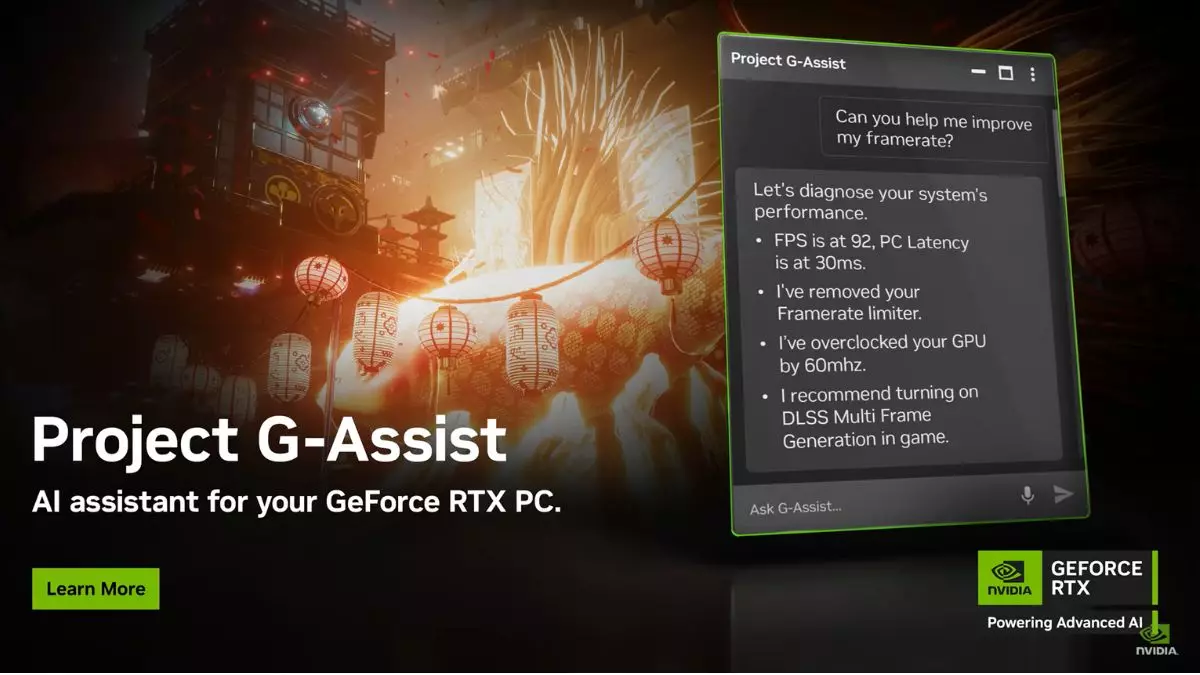Nvidia has recently unveiled Project G-Assist, a groundbreaking artificial intelligence assistant designed for gamers who rely on GeForce RTX GPU-powered desktops. While this announcement showcases the potential of AI within the gaming sphere, it also raises compelling questions about the direction of the industry. The AI assistant, which is currently in its experimental phase, is not just another digital tool; it represents a shift towards creating truly intelligent companions that can radically alter our gaming experience.
A Local Revolution in Gaming
What sets G-Assist apart is its emphasis on privacy and locality. Unlike many AI services that require internet connectivity to function, this assistant operates completely on the user’s device, safeguarding personal data and ensuring quicker responses. The implications of this model are profound. In a world that increasingly grapples with data privacy concerns, G-Assist can function without the usual risks associated with cloud computing, allowing gamers to engage with AI without fear of surveillance or data breaches. This local operation reflects a growing recognition of the importance of user privacy, giving Nvidia an edge in a market fraught with concerns over data governance.
A Comprehensive Gaming Companion
The functionality of G-Assist extends far beyond simple recommendations. Equipped with a small language model fine-tuned for gaming scenarios, it can optimize system settings in real-time, analyze performance metrics, and even suggest strategies for improving gameplay. Imagine receiving tailored advice during an intense multiplayer session or having your system automatically tweak itself for optimal performance while playing a graphically demanding title. This level of engagement highlights a significant advancement in user interactivity as the product is not merely reactive but proactive.
The Future of Personalization
In many ways, G-Assist symbolizes the future of personalized gaming experiences. By processing voice, text, and visual inputs, this AI has the potential to revolutionize the way gamers engage with their environments. Whether it’s adjusting fan speeds or analyzing previous game replays for performance strategies, G-Assist effectively acts as a personalized coach and technician rolled into one. As Nvidia continues to develop this technology, the idea of having a fully dedicated gaming assistant will likely not just be a luxury but an expectation for future gamers.
Challenges Ahead
However, while the ambitious features of G-Assist are commendable, there remain hurdles to overcome. Its current exclusivity to desktop systems raises equity concerns within the gaming community, particularly for those relying on laptops. Moreover, the assistant’s limited language capability confines its accessibility and could alienate international users. Nvidia must address these issues to ensure equitable access to such powerful tools.
The Bigger Picture
Ultimately, Project G-Assist signifies not just an innovation in gaming technology but a broader cultural shift towards embracing AI as an everyday companion. It raises crucial discussions about ethical considerations, data privacy, and how AI will reshape our interactions with technology. As the gaming landscape continues to evolve with AI at the forefront, G-Assist may very well be leading the charge into a new era, yet the sector must navigate potential pitfalls responsibly to maximize benefits for all users.

Leave a Reply